How a Saturday night internet wormhole effectively ruined my favorite store.
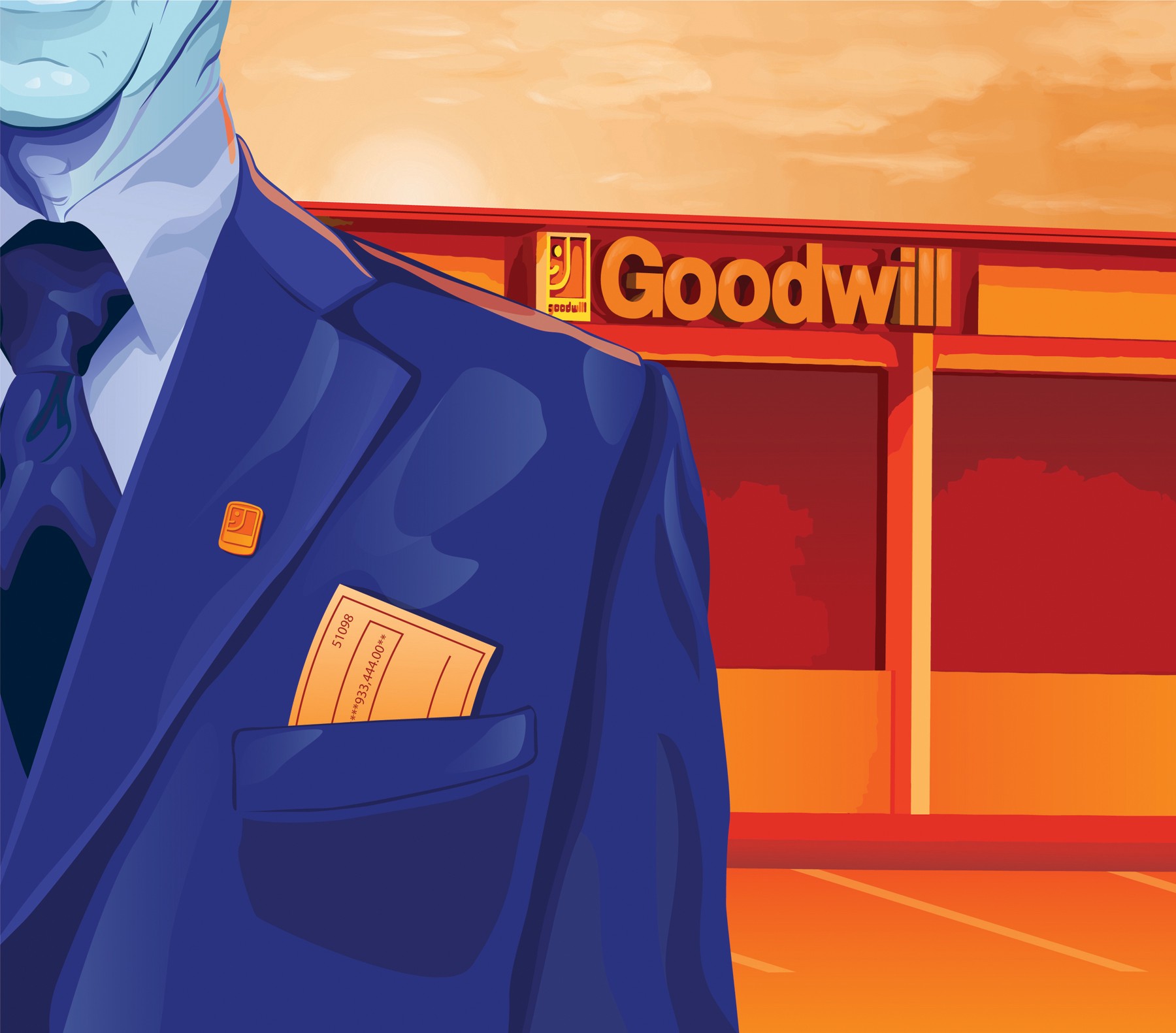 Image: Henry J. Cordes
Image: Henry J. Cordes
?We are trapped. Everybody who works at Goodwill is trapped.? -Harold Leigland, $5.46 an hour
Goodwill has long been my favorite store. As someone who detests the practices of most businesses that exploit cheap labor in foreign countries, not to mention the cost of buying goods retail, I love shopping at Goodwill. At the same time, I always wondered- is something a little sketchy here?
Everybody loves Goodwill. I?m not denying that. Your favorite collectible art piece or pair of pants you could never afford at retail price are fond, happy discoveries borne within that treasure trove palace behind those beautiful blue doors. The glories of thrift store shopping aside, is Goodwill really a charity?
Legally, yes, it is a tax-exempt nonprofit that does perform work for the public good.
But morally? It?s got some pretty dark secrets.
I am not denying that Goodwill does some really wonderful stuff. But what if we didn?t know the whole story?
In the United States and Canada, the thrift store giant runs over 164 regional Goodwill organizations and 3,200 individual stores. Goodwill brands itself as a nonprofit that provides jobs to disabled workers. But that?s not quite the whole story. Suspicious business practices and lack of corporate oversight will make you question if Goodwill is actually such a good guy after all.
Here are my 10 most outstanding contentions.
1. Less than one-eighth of the company?s profit goes toward its charity work.
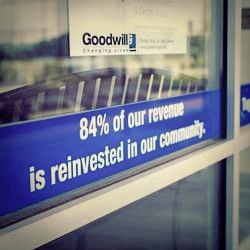
Goodwill sells free goods at a profit, but less than one eighth of that profit actually goes to the job-related programs they market as their primary pillar of charity work.
In a 2016 piece for Nonprofit Quarterly Ruth McCambridge examines a recent World-Herald piece by Henry Cordes, which detailed some troubling information Cordes uncovered within Goodwill financial documents he obtained under the Freedom Of Information Act. Cordes writes:
?While Goodwill Omaha runs job training and assistance programs that serve thousands annually, nearly all of those activities have been funded by government grants and contracts ? not the $4 million in annual profits generated by Goodwill?s thrift stores in eastern Nebraska and western Iowa. Even its signature program that employs disabled job trainees within its stores is primarily funded by school districts.
Goodwill officials identified only $557,000 in jobs program spending in 2015 that was funded by retail sales.
Most store profits are being consumed by administrative overhead, which includes much of the pay to its top leaders.?
It?s a hard sell to argue that your primary goal is job training when only $557,000 out of $4 million in profit is spent on that goal- and even harder when your top CEOs cash in million-dollar salaries ($57.3 million in executive bonuses total) borne from the profit of a disabled workforce exploited for cents on the dollar.
2. Your donated items get shipped out to neo-imperialist buyers that threaten developing industry in third world countries.
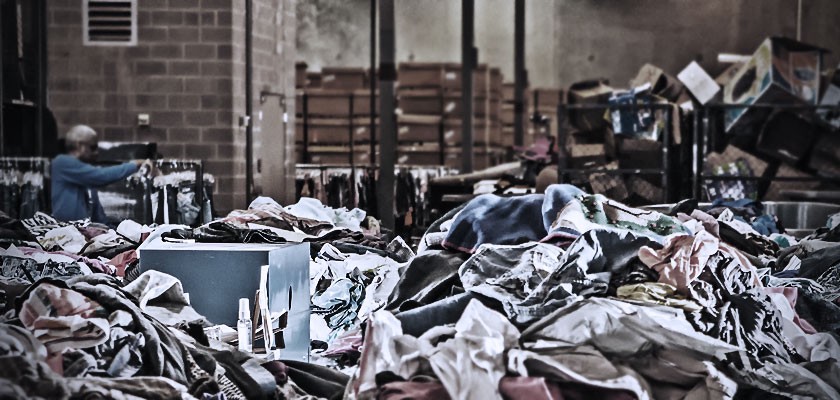
If Goodwill can?t sell your clothes, it ships them to sell to third world countries overseas ? a practice that is widely documented as harming industry in developing nations by importing cheaply priced goods- or, if that doesn?t happen, they go to a landfill.
3. Goodwill has actively fought against legislative proposals to raise the minimum wage.
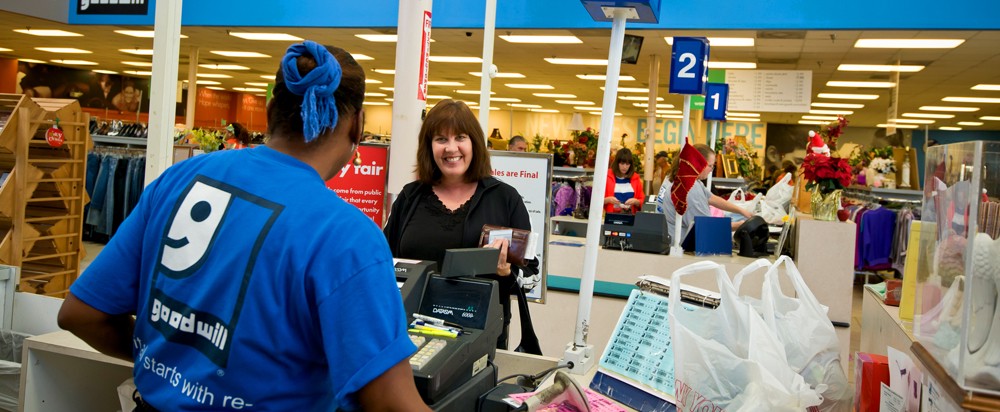
Despite bringing in over $3.8 billion in revenue, the nonprofit argues that it can?t afford to pay its employees.
4. Goodwill seized on an archaic 1938 law to justify paying workers as little as 22 cents an hour.
Under Section 14 (c) of the Fair Labor Standards Act, an outdated law that Autistic Self Advocacy Network president Ari Ne?eman calls a ?vestige of the past,? over 7,300 workers in 14 states are paid less than 23 cents an hour. According to Pennsylvania records from 2009, some Goodwill workers earned as little as 22, 38, and 41 cents an hour.
An NBC News critical investigation first broke the story in 2013.

Cheatsheet?s Chloe Della Costa writes, ?Goodwill Industries, a tax-exempt non-profit that generates more than $5 billion in annual revenue and pays its executives six-figure and seven-figure salaries, pays some of its workers as little as $0.22 per hour. Why? Because they are disabled.?
One worker?s pay stub revealed that she was paid $3.27 for 24 hours of work.
5. Many people with disabilities have actually died from injuries borne of Goodwill?s unsafe workplace safety practices.
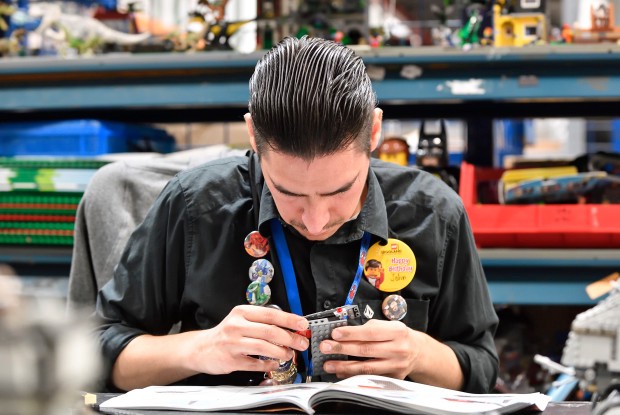 Source: Goodwill Industries
Source: Goodwill Industries
As disabled employees are not protected by the same laws as their able-bodied coworkers, Goodwill relegates certain dangerous tasks to disabled workers. Several employees have died performing these tasks.
Despite failing to provide up-to-date equipment, safety training, and any kind of company oversight policy, the nonprofit maintains that it is not responsible for the employees killed performing these on-the-job tasks, blaming ?employee negligence? instead.
Alex Moyle writes:
At the end of September last year, 26-year-old Abraham Garza was killed when his head was crushed as he checked the alignment between a heavy steel bin and a trash compactor at the Goodwill store on Franklin Boulevard in South Sacramento, California.
(PS: All the other times this has happened.)
?It?s a question of civil rights. I feel like a second class citizen, and I hate it.? -Sheila Leigland, $2.75 an hour
6. Employees that criticize Goodwill?s practices end up getting fired, threatened, and publicly defamed by the company.
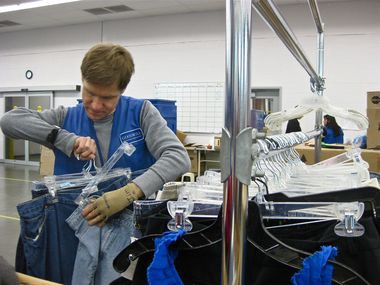 Source: Goodwill
Source: Goodwill
Dedicated Goodwill employee David Goudie, who had pushed for workplace safety reform prior to a fatal accident at a Sacramento Goodwill in 2016, captured the careful attention of company?s executive board by giving public testimony describing his disabled co-worker?s fatal accident, including delivering an account of his superiors? gross negligence in workplace safety regulations.
When this concerned employee repeatedly filed reports to his supervisors addressing these dangerous conditions and a need for improvement in company policy, he was fired and publicly slandered in a company press release.
?Goodwill management didn?t take responsibility for the tragedy. Instead, they fired [David Goudie], banning him from the premises when he reported to work 10 days after the incident.
Even now, months after Goudie went public, Goodwill is standing by its story. ?Goodwill definitely grieves over the tragedy of this accident,? said spokeswoman Karen McClaflin. ?But this was caused by the negligence of one employee??
Goudie paused: ?A little boy will be growing up without his father ? for no good reason. I can think of no rational explanation for Goodwill?s lack of concern other than executive incompetence or greed or both.?
7. Employees are subject to strict, unrealistic performance quotas, and their wages are docked if they?re not fast enough.

If workers don?t hang 100 items of clothing in 32 minutes, their pay gets docked- pay that is already far below the minimum wage. This punishes people with disabilities, and creates an easy means of leverage for the company to continue reducing these workers? pay.
In her 2015 piece for Cheatsheet, Chloe Della Costa writes:
?Goodwill wants to see workers hang 100 garments in 32 minutes, and depending on how badly employees miss the mark, hourly wages are cut. Leigland says she and her husband, who is also blind and worked at Goodwill, should not have been hanging clothes to begin with because they can?t see the sizes. She explained to NBC that she is college-educated and would have been more successful at a different job, such as answering phones.?
?At $2.75 it would barely cover my cost of getting to work. I wouldn?t make any money.?
-Sheila Leigland
8. Hiring disabled and formerly incarcerated people is not a ?venerable? act of charity, it?s corporate responsibility.
 Source: Goodwill
Source: Goodwill
Workers who suffer from systemic discrimination deserve safe workplace environments and realistic wages. Pithy rhetoric that justifies poor treatment by saying ?It?s the best they can do, and at least we gave them jobs? is not a progressive, socially responsible move.
It echoes the very same attitudes against Americans with disabilities that Goodwill claims it is working to fight. People with disabilities are not a burden, and it is a company?s job to accommodate all employees? needs, fairly compensate them for their labor, and give them the same tasks and work conditions as an able-bodied co-worker.
?People are profiting from exploiting disabled workers. It is clearly and unquestionably exploitation.?
-Ari Ne?eman
9. Goodwill?s legal status as a charity wins grants and tax subsidies, manifesting in hugely lucrative quantities of profit for executives that are not evenly distributed amongst the people they are intended to benefit.
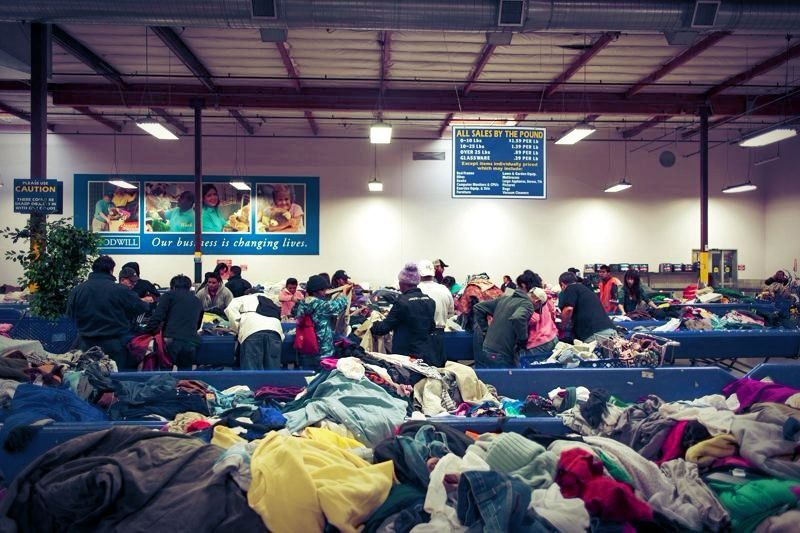
Goodwill?s practices are not that far out of the league of ethically questionable business behavior that has come to determine what we expect of businesses. The difference that Goodwill brands itself as a charity. As Henry J. Cordes aptly remarks, ?Executive pay at Goodwill Omaha stands in sharp contrast to the compensation of its rank-and-file workers, made up largely of relatively low-paid store managers and social workers and store clerks paid little more than minimum wage. Federal records show the nonprofit also recently has paid less than the minimum wage to 110 workers with significant disabilities ? legal under a controversial federal law that allows such ?subminimum? wages for the disabled.?
A Forbes investigation quoted disabled former Goodwill workers recounting how, under the wage certificate program, they were made to compete in a grotesque race against the clock ? and had their wages cut for every garment below quota that they didn?t sort, button and hang on a rack in the time allowed.
At the same time, Goodwill was paying its top executives $53.7 million in compensation. And Doug Barr, the CEO of Goodwill of Southern California, was himself taking home $1,188,733 in total compensation.
The fact is that while Goodwill does many wonderful things, most of the funding for its socially beneficial programs comes from government grants and subsidies. So how much good really is the organization doing for the public?
10. Perhaps most of all, it is troubling to promote your business as a charitable institution, project a false image of your workplace practices, and abuse the public?s trust.
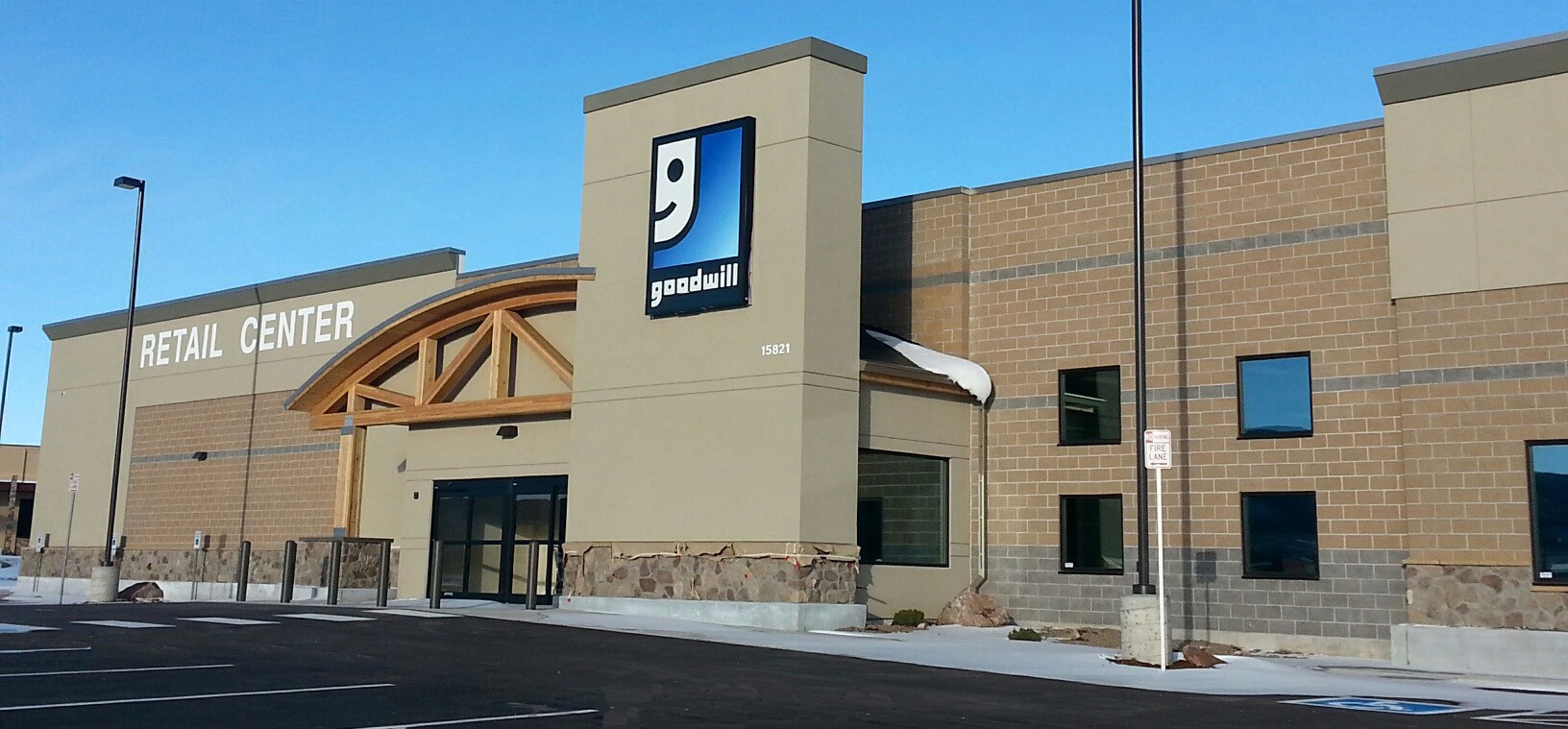
This discredits the truly valuable, truly charitable work many smaller, independent thrift stores work for tirelessly, and it deceptively routes consumer spending and positive intentions away from the organizations actually performing charitable or honest work in their communities. In fact, I have noticed in my own hometown that Goodwills somehow seem to pop up literally right next to smaller, independently owned thrift stores, doubtlessly in an outright attempt to redirect potential customers away from these established thrift stores and through Goodwill?s own doors.
It?s not that Goodwill is markedly different from other dominant businesses. And it?s not that Goodwill hasn?t done good- it absolutely has. It?s that Goodwill has not been honest, and it has somehow managed to convince the American public of its status as a reputable charity, all the while consciously campaigning to project that image while obscuring its crimes against the very people it claims it is working to help.
This raises larger questions about American expectations of corporate ethics, the laws that prop up unjust systems, and abuse of the most vulnerable populations among us.
Corporate abuse of employees has become a feature of modern capitalism, but doing so under the guise of charity? That?s something especially concerning about that.


